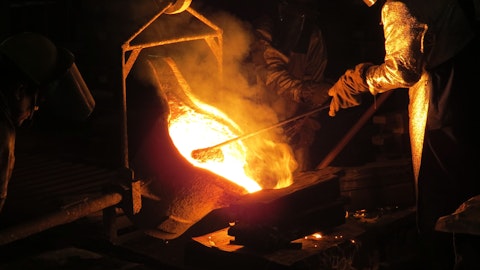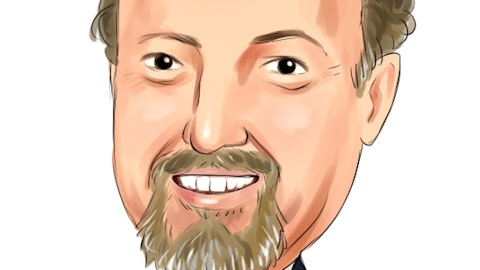Carlos de Alba: So the question I have is just a clarification, perhaps, but on explaining the increase in leverage, it’s — the release, and I think your comments mentioned that this was a one-off increase in leverage, mainly because of the result of the dividend impairments, sorry, the payment of dividends of BRL2.7 billion. So my question is if the dividends will stop or will come down because if not, then it’s not really in my opinion, a one-off and the dividend payments are going to be recurrent, I would like to understand how is the Company planning on reducing leverage without depending on higher commodity prices. Just — it wasn’t clear to me how that will be achieved. Do you have more options to increase volumes significantly or reduce cost significantly or reduce working capital significantly or maybe it’s all of the above. But I just wasn’t very clear what that one-off commitment.
Marcelo Cunha Ribeiro: That was an extraordinary expense. It was the amount of the dividends that were paid now. We reached the level of BRL2.7 billion. Last year, we were very close to BRL1 billion per semester. So as a plan, we want to return to these previous levels every year, we would be saving that BRL3.4 billion. The difference of BRL2 billion per year, BRL5.4 billion. This is because of that extraordinary nature of what happened in the last six months, and we want to improve our cash flow. And this will reduce our leverage. And of course, we have other projects, the cement IPO, the potential partnership in terms of energy, all of which will guarantee a very rapid deleveraging to the levels of our guidance. And even without these initiatives, as we are generating cash, the leverage — the deleveraging will come anyway, but we want this to happen before the end of this year.
We will have lower dividends in the second half of the year, enhancing results with a cash generation with new initiatives that will help us to attain that 1.95x as mentioned.
Carlos de Alba: All right. And just one question then. So could you repeat what is the level of dividends that you are now targeting? Did I hear you well and it’s going to be around BRL1 billion, BRL1.1 billion. Is this per quarter?
Marcelo Cunha Ribeiro: Yes, you heard me well, Carlos. That’s what I said. We’re going to back — going back to our historical levels that were around that figure. These are not quarterly figures they are for half of the year.
Operator: The next question comes from Vanessa Quiroga from Credit Suisse.
Vanessa Quiroga: My question is about the [prepayment points], which is the percentage of the volume of iron ore that has been closes in that type of contract, which are your maximum volumes. The second question, if you could mention other strategies to attain the deleveraging. You spoke about the IPO of cement, the partnerships? Do you still have other initiatives that you’re working on?
Marcelo Cunha Ribeiro: In terms of the prepayments, it’s important to clarify that although the financial volumes are significant in terms of the iron ore for exports that they represent, these are lower. The anticipated value per ton has increased. So we have committed less and less future tons. And we hope that the coming year, we will have 6.6 million tons of the [40%] that we should sell or more. All of this will be committed in this structure, about 15%. This is what we expect to follow. We don’t expect to increase this or increase this percentage. What we did in the past was to reach very similar levels. We’re going to amortize them as they mature, and then we go back to work with this balance again, and this is how we’re going to continue in the coming years without significant changes in the amounts committed.
Regarding other initiatives, once again the search of a partner — we could go back to our original plan to control the Company, which would leave us to deconsolidating the balance. And if we speak about the cement IPO and speak about successful IPOs, we’re thinking of a similar figure, BRL3 billion. These are very robust initiatives highly aligned with our strategy, and that will bring about the deleverage in the short term. I think this is more than sufficient to comply with our guidance.
Operator: Well, thank you. As we have no further questions, we will return the floor to Mr. Marcelo Cunha Ribeiro, the CFO and Executive IRO, for the closing remarks.
Marcelo Cunha Ribeiro: I would simply like to thank all of you for your attendance in our call, and we hope to see you in the call for the third quarter. Have a good afternoon.
Operator: Thank you. The CSN earnings conference has come to an end. You can now disconnect and have a good day.
Follow Companhia Siderurgica Nacional (NYSE:SID)
Follow Companhia Siderurgica Nacional (NYSE:SID)
Receive real-time insider trading and news alerts



